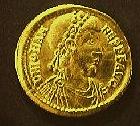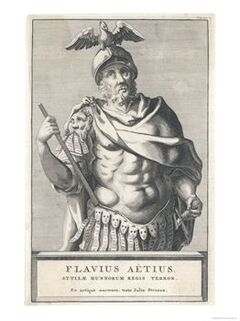Ioannes
“Give that man a hand - his own once we cut it off.”
“My empire for the Huns!”
It must have seemed once a wizard thing to have done. One day you are shuffling papyrus scrolls and copying out tedious correspondence to be sent to your boss's friends and enemies around the Roman World. Perhaps you were lucky to have used that Christian invention - books or codexes as they were called at the time. Much easier to stack and file. Then you receive a message to meet someone important and the next thing you know, you are the ruler of the Western half of the Roman Empire. Who could have resisted that offer? Well a Roman Civil Servant called Ioannes [1] thought he was just the ticket and stepped up to the plate.
Sitting on a marble throne that was once polished by the bottoms of emperors since the age of Augustus would have gone to anyone's head. The luxuries to enjoy, women who now found you sexy and attractive, marble bath to splash around in and to wear clothes of the finest purple dyed silk. Then flash forward two years later. Now you are not dressed so well and have gone through one public humiliation by your enemies. You are also sitting backwards on a donkey, your severed right hand slung around your neck for your treason and now you face the crowd for the last time. Where once flowers would have been scattered, now it is rotten fruit and stones coming in your direction. The torture will only cease when you are dragged off the donkey and your head is chopped off to be stuck on a pike. Such was the fate of Ioannes.
The Situation[edit]
Since nothing survives about Ioannes's character before his sudden arrival as Emperor - and presumably what was left of him ended up as cattle feed once it was all over - one can only wonder why he thought he could stay as ruler. His previous employer, the supremely stupid and cowardly Honorius had allowed on his watch the sack of Rome by the Visigoths, abandoned Britain to the Anglo-Saxons and let Vandals and others to cross into Gaul and Spain unopposed to rape, plunder and emptying every wine cellar from the Rhine to the Straits of Gibraltar. Ioannes wasn't a soldier and had no family connection to the imperial dynasty. He was a quill pusher, one of the army of thousands dotted all across the Roman World to do all the boring stuff that made this ancient regime carry on.
The Elevation[edit]
Ioannes chance to step from out of the shadows had happened because Emperor Honorius had died in Ravenna, surrounded by chickens but no members of his family. His sister Galla Placidia had fled to Constantinople, taking her two young children to live with their cousin Emperor Theodosius II. If the rumour is correct, Honorius is said to have named his favourite chicken 'Ravenna' as his successor but even Romans baulked at that choice (though Caligula was said ready to have made his horse, senator Incitatus a candidate for the imperial throne if all else failed).
So word was sent to Ioannes that the job was his. His two sponsors were the Roman generals Castinus and Flavius Aetius, a known expert on the 'Hun' problem and how best to employ them in your service. Why neither of these two wanted the main job could be down to professional jealousy and a preference for a nonentity in the imperial post. As indeed Emperor Honorius had been and Ioannes's successor Valentinian III would turn out to be.
The Response[edit]
Ioannes sent a messenger to Theodosius to announce his new job and that, as was the nature of the Roman Empire (legally one unit with two offices), they were now officially work colleagues. Theodosius responded by imprisoning the messenger and recognising his cousin Valentinian as Emperor in the West, though the latter was only six years old (but then Theodosius had been in short togas when he became emperor in 408).
Ioannes noted the unfavourable answer but still carried on ruling and having money coined with his head on it. Surprisingly, there were no rebellions against him in the West - unlike the plethora of chancers who had plagued Honorius's regime a few years earlier. Perhaps that was because the real challengers to Ioannes were employed by him.
However one major chunk of the the Roman Empire refused to accept Ioannes. This was Carthage. Count Boniface of them parts laughed when he got the imperial notification from Ioannes, remembering perhaps the man as that miserable scribe who couldn't spell his name right a few years earlier. Carthage declined to recognise him and neither did they endorse Valentinian.
The Invasion[edit]
In 424 Theodosius paid for an expedition to displace Ioannes. A fleet was sent from Constantinople but got caught in a storm and was sunk. Ioannes thought that omen would deter Theodosius and perhaps help change his mind about him. He even treated well the bedraggled commanders of the fleet - placing them under house arrest. Aetius said that was a bad idea and knowing Theodosius could make another invasion possible, left Ravenna to head towards prime Hun country, in Hungary. He said there was a young man there he would like Ioannes to meet: Attila the Hun.
The Betrayal[edit]
Ioannes other supporter Castinus also had made himself scarce, heading off to Spain for some urgent repairs to one his villas out there. With neither his main generals around, the captured East Roman commanders persuaded their jailers they were 'backing the wrong horse'. Ioannes was deposed and dungeoned whilst word was sent to Galla Placidia who was conveniently close by to come to the city of Aquelia. There she met Ioannes in chains, stripped of his fine clothes and personal shaving kit. By her side was Valentinian and his sister Justa Grata Honoria.
It is possible Ioannes tried to argue that he was only emperor because the next choice - a chicken - would have been Rome's ruin. Perhaps he also added that he would be quite happy to have his old job back, perhaps at lower grade for his 'naughty behavior'. Turning to Valentinian for approval (inspecting the contents of his diaper), Galla Placidia condemned Ioannes with the full fury of an angry Empress. The usurper would die, choreographed entertainment for the local rude locals and others considering to jump up too far from their station. Let that be a lesson!
The Death[edit]
So Ioannes died. Perhaps not so quickly. Whether he lost his head soon after his hand or had other bits lopped off as side dishes, isn't related. As with many things, timing could have changed it all. A few days after Ioannes was killed, Aetius returned to Italy with his Hun army. Perhaps the young Attila was with him. May be they asked to see Ioannes - and were shown the unfortunate ex-emperor's head. Nothing was recorded - or if it was - lost in some future destruction.
References[edit]
- ↑ Latin for 'John'. Ioannes was 'Purple Johnny'.
| Preceded by: Honorius (in the West) |
Roman Emperor 423-425 |
Succeeded by: Valentinian III (in the West) |
| ||||||||||||||||||||||||||




